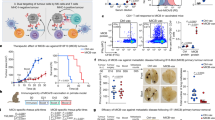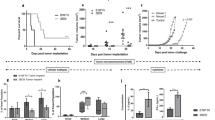Abstract
The cure of micrometastases following surgery is the major goal of cancer immunotherapy. We have recently isolated tumour-associated antigen (TAA) peptides, MUT 1 and MUT 2, derived from a mutated connexin 37 gap-junction protein, from the malignant 3LL-D122 murine lung carcinoma. We now report that synthetic MUT 1 or MUT 2 induces effective antitumour cytoxic T lymphocytes. Peptide vaccines protect mice from spontaneous metastases of 3LL-D122 tumours. Moreover, peptide vaccines reduce metastatic loads in mice carrying pre-established micrometastases. Tumour-specific immunity was primarily mediated by CD8+ T cells. This is the first evidence that peptide therapy may be effective in treatment of residual tumours and provides a rationale for the development of peptide vaccines as a modality for cancer therapy.
This is a preview of subscription content, access via your institution
Access options
Subscribe to this journal
Receive 12 print issues and online access
$209.00 per year
only $17.42 per issue
Buy this article
- Purchase on Springer Link
- Instant access to full article PDF
Prices may be subject to local taxes which are calculated during checkout
Similar content being viewed by others
References
Urban, J.L. & Schreiber, H. Tumor antigens. Annu. Rev. Immun. 10, 617–644 (1992).
Dranoff, G. et al. Vaccination with irradiated tumor Cells engineered to secrete murine granulocyte macrophage colony-stimulating factor stimulates potent, specific and long lasting anti-tumor immunity. Proc. natn. Acad. Sci. U.S.A. 90, 3539–3543 (1993).
Melief, C.J. Tumor eradication by adoptive transfer of cytotoxic T lymphocytes. Adv. Cancer Res. 58, 143–175 (1992).
Rosenberg, S.A. et al. Use of tumor infiltrating lymphocytes and interlukin-2 in the immunotherapy of patients with metastatic melanoma. New Engl. J. Med. 319, 1676–1680 (1988).
Boon, T., Cerottini, J.C., Van Der Eynde, B., Van Der Brugenn, P. & Van Pel, A. Tumor antigens recognized by T lymphocytes. Annu Rev. Immun. 12, 337–365 (1994).
Mandelboim, O. et al. CTL induction by a tumor associated antigen octapeptide derived from a murine lung carcinoma Nature 369, 67–71 (1994).
Plaksin, D., Gelber, C., Feldman, M. & Eisenbach, L. Reversal of the metastatic phenotype in Lewis lung carcinoma cells following transfection with syngeneic H–2Kb gene. Proc. natn. Acad Sci. U.S.A. 85, 4463–4467 (1988).
Sette, A. et al. Antigen analogs/MHC complexes as specific T cell receptor antagonists. Annu. Rev. Immun. 12, 413 (1994).
Rock, K.L., Rothstein, L., Gamble, S. & Fleischacker, F. Characterization of antigen-presenting cells that present exogenous antigens in association with class I MHC molecules. J. Immun. 150, 438–446 (1993).
Kovacsovics-Bankowski, M. & Rock, K.L. A phagosome-to-cytosol pathway for ex-ogenous antigens presented on MHC class I molecules. Science 267, 243–246 (1995).
Levitski, H.I., Lazenby, A., Hayashi, R.J. & Pardoll, D.M. In vivo priming of two distinct anti tumor effectors populations: The role of MHC class I expression. J. exp. Med. 179, 1215–1224 (1994).
Kunding, T.M. et al. Fibroblasts as efficient antigen-presenting Cells in lymphoid organs. Science 268, 1343–1346 (1995).
Kast, W.M., Brandt, R.M. & Melief, C.J. Strict peptide length is not required for the induction of cytotoxic T lymphocyte-mediated anti viral protection by peptide vaccination. Eur. J. Immun. 23, 1189–1192 (1993).
Schultz, M., Zingernagel, R.M. & Hengarther, H. Peptide-induced anti viral protection by cytotoxic T cells. Proc. natn. Acad. Sci. U.S.A. 88, 991–993 (1991).
North, R.J. & Awwad, M. Elimination of cycling CD4+ suppressor T cells with an anti-mitotic drug releases non-cycling CD8+ T cells to cause regression of an advanced lymphoma. Immunol. 71, 90–95 (1990).
Rakmilevich, A.L. & North, R.J. Elimination of CD4+ T cells in mice bearing advanced sarcoma augments the anti tumor action of interleukin-2. Cancer Immun. Immunother. 38, 197–112 (1994).
Rakmilevich, A.L. & North, R.J. & Dye, E.S. Presence of CD4+ T suppressor cells in mice endeared unresponsive to tumor antigens by intravenous injection of irradiated tumor cells. Int. J. Cancer. 53, 338–343 (1993).
Awwad, M. & North, R.J. Cydopohsphamide-induced immunologically mediated regression of a cyclophosphamide-resistant murine tumor: A consequence of eliminating precursor L3T4+ suppressor T-cells. Cancer Res. 49, 1649–1654 (1989).
Gelber, C., Eisenbach, L., Feldman, M. & Goodenow, R.S. T-cell subset analysis of Lewis lung carcinoma tumor rejection: Heterogeneity of effectors and evidence for negative regulatory lymphocytes correlating with metastasis. Cancer Res. 52, 6507–6515 (1992).
Powrie, F. & Coffman, R.L. Cytokine regulation of T-cell function: Potential for therapeutic intervention. Immun. Today 14, 270–273 (1993).
Feltkamp, M.C.W. et al. Vaccination with cytotoxic T lymphocyte epitope-contaning peptide protects against a tumor induced by human papillomavirus type 16-transformed cells. Eur. J. Immun. 23, 2242–2249 (1993).
Author information
Authors and Affiliations
Rights and permissions
About this article
Cite this article
Mandelboim, O., Vadai, E., Fridkin, M. et al. Regression of established murine carcinoma metastases following vaccination with tumour-associated antigen peptides. Nat Med 1, 1179–1183 (1995). https://doi.org/10.1038/nm1195-1179
Received:
Accepted:
Published:
Issue Date:
DOI: https://doi.org/10.1038/nm1195-1179
This article is cited by
-
A randomised controlled trial of long NY-ESO-1 peptide-pulsed autologous dendritic cells with or without alpha-galactosylceramide in high-risk melanoma
Cancer Immunology, Immunotherapy (2023)
-
Mutations as munitions: Neoantigen vaccines get a closer look as cancer treatment
Nature Medicine (2016)
-
The administration of drugs inhibiting cholesterol/oxysterol synthesis is safe and increases the efficacy of immunotherapeutic regimens in tumor-bearing mice
Cancer Immunology, Immunotherapy (2016)
-
mRNA-based vaccines synergize with radiation therapy to eradicate established tumors
Radiation Oncology (2014)
-
Discriminability of tryptophan containing dipeptides using quantum control
Applied Physics B (2013)



